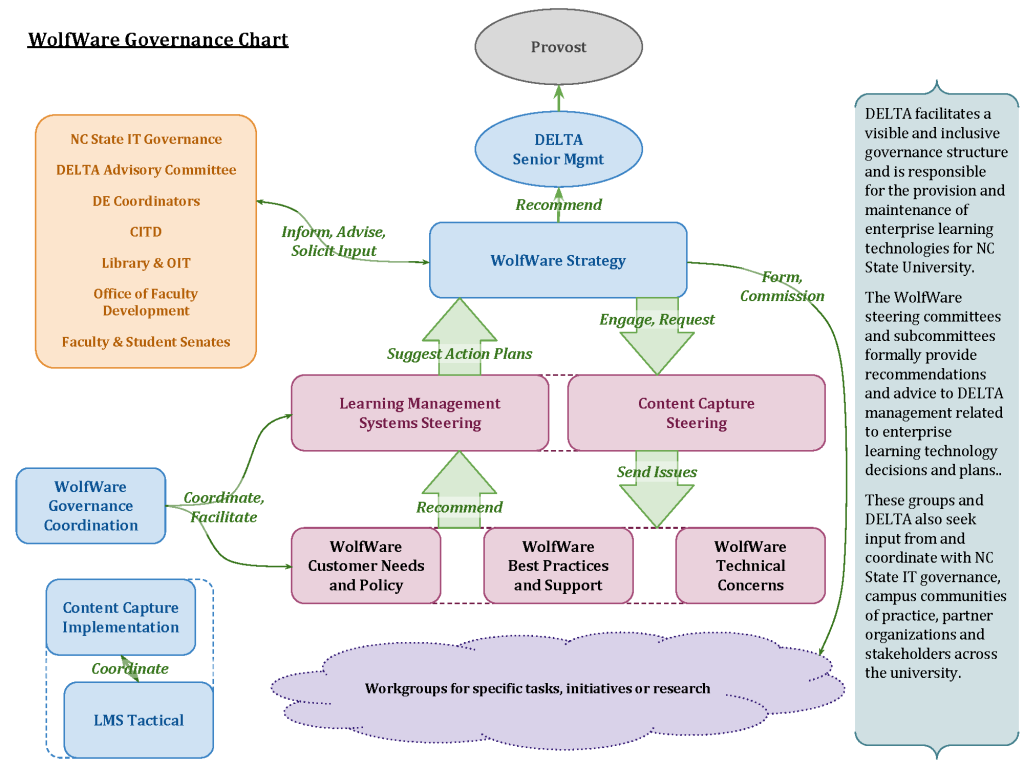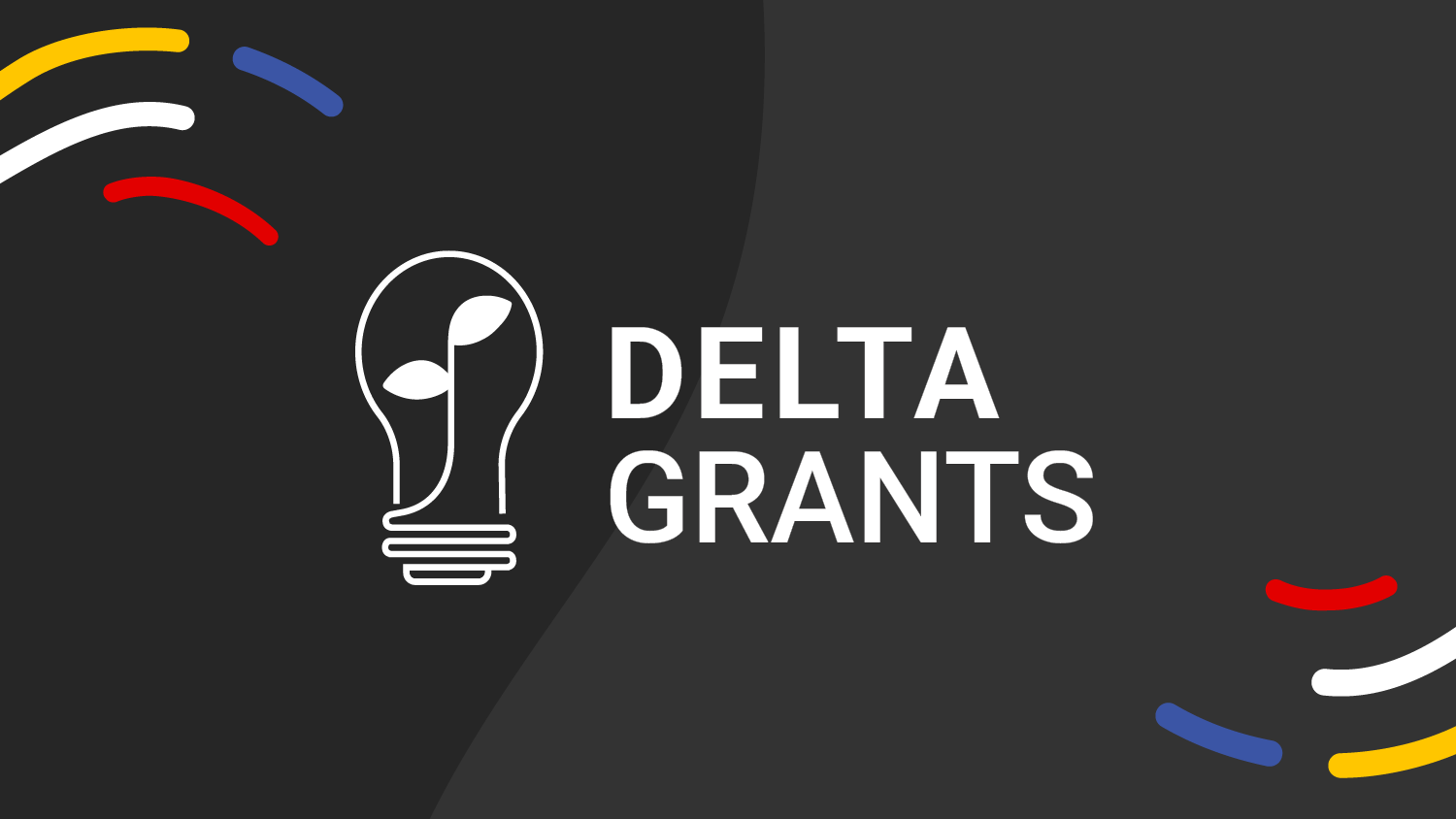Who’s Behind WolfWare? Governance Structure Creates Transparency, Efficiency

WolfWare is the collection of Learning Technology Tools that DELTA provides to facilitate teaching at the university. Through WolfWare, DELTA supports these tools:
- Moodle (our learning management system or LMS)
- WordPress for websites
- Zoom for web conferencing
- Top Hat for interactive quizzing, polling and discussions
- Mediasite for the creation of video content
- WolfWare Email lists tied to a class roster
- Integration with academic and the REPORTER registration systems
- and other integrations with third-party software.
WolfWare serves NC State academic community, internal training and noncredit activities and external outreach endeavors. To make sure that we are meeting the needs of this diverse group of technology users, we actively encourage faculty and other stakeholders across the university to participate in our governance structure. If you are interested in serving, please contact Marty Dulberg, the WolfWare Coordinator, via email at wolfware_governance@ncsu.edu.
Why Governance?
In order to meet the needs of the NC State community, DELTA created a governance process and structure to allow us to follow core principles important to our mission.
- Transparency: It’s important that anyone in the NC State community can find out what we are doing, what decisions are made and why, and what procedures are in place. Decisions are made with community input, and we are accountable to the community.
- Responsiveness: We solicit feedback and input about WolfWare learning technologies from the NC State community to make sure we are meeting their instructional needs. We receive input about decisions, requests for changes and new technology features to make sure we are addressing technology needs. Governance helps us understand the learning technology needs of our instructors to enable them to more effectively teach their classes.
- Furthering the mission of the university: Providing technology to instructors that allow them to have a more positive impact on student outcomes.
How is WolfWare Governance Structured?
The WolfWare Governance structure was designed to ensure community input for:
- Adopting New Technologies: Decisions about which technologies are selected for our community and considerations for how they are deployed.
- Retiring Technologies: Decisions about when to retire technologies, how to retire them and how to ease the transition to a new technology are made.
- Standard Operating Procedures: Discussions and decisions around data retention, appropriate usage, and other areas of importance.
- Feature Requests: Requests are considered with an eye toward value, breadth and depth of impact, and ease of implementation.
History of Governance
WolfWare governance was started 10 years ago as we launched a new era in learning technologies at NC State. By moving from a proprietary LMS to a more open source philosophy, we recognized that there would be a need for policy decisions that would affect everyone using the technology. Our collaboration with the campus community initially started with our partners in the Moodle pilot and expanded to our present structure. The governance structure and processes are a work in progress. Over time we have updated and fine tuned standard operating procedures (SOPs) to better reflect the campus needs, made key decisions about new and old technology, streamlined processes such as feature request consideration and generally have worked to make sure we are able to more effectively use the limited resources available.
WolfWare Committees
 Within the WolfWare Governance structure, there are five committees that have a majority of members external to DELTA. These committees rely upon the participation of members all across the university.
Within the WolfWare Governance structure, there are five committees that have a majority of members external to DELTA. These committees rely upon the participation of members all across the university.
The LMS Steering Committee is responsible for considering and coordinating the needs and recommendations from the other committees for all enterprise learning technologies (with the exception of content capture), reconciles differences (if any), and suggests action plans for services to the DELTA Strategy Team. In addition, this steering committee points issues to particular committees to discuss, and/or directs the formation of workgroups around specific tasks (e.g. assessment, policy).
The Content Capture Steering Committee considers and coordinates the content capture needs and recommendations from other committees, reconciles differences (if any), and suggests action plans for services to the DELTA Strategy Team. In addition, this steering committee sends issues to particular committees to discuss, and/or directs the formation of workgroups around specific tasks (e.g. assessment, policy).
The Best Practices and Support Committee provides suggestions for “best practices” from a user-centered approach to enterprise academic technologies, from the way users might utilize a certain tool to what settings we might recommend from a user and instructional support perspective to optimize the teaching and learning environment in a pedagogically sound manner. This group also discusses and documents the implications of any suggested add-ons to our emerging academic technology infrastructure from best practices and user and training perspectives to provide recommendations to the Steering Committees. Finally, this group recommends training and support structures and strategies that will help others fully utilize campus academic technologies, including identifying appropriate channels for providing technical support to instructors and students.
The Customer Needs and Policy Committee builds and maintains an awareness of college-level needs related to DELTA enterprise academic technologies and recommends strategies for collaboratively meeting these needs to the Steering Committees. This group also discusses and documents the implications of these technologies from a policy perspective, drafting policies as requested, and providing recommendations to the Steering Committees.
The Technical Committee examines the technical implications of decisions and provides an informed technical opinion to the Steering Committees regarding integrations, changes and additions to our campus LMS and content-capture systems. This committee explores technical feasibility (including impact on and/or integration with other campus systems), documents appropriate technical methodologies, and implements a collaborative technical workflow for providing ongoing enterprise-level LMS and content capture services at NC State. In this capacity, this committee serves as a resource for developers of modules for campus LMS services and as a resource for content capture technical implementation needs.
Want to Learn More or Participate in WolfWare Governance?
Find more information about WolfWare Governance and read the SOPs. The SOP’s cover the service and information about the governance structure as well as committee membership.
DELTA encourages instructors to participate in WolfWare Governance. If you have any questions or concerns, please send an email to wolfware_governance@ncsu.edu.


